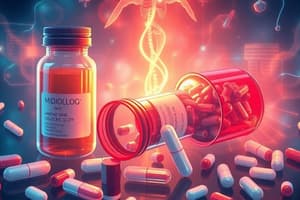Podcast
Questions and Answers
What is the primary mechanism of action of antiplatelet medications?
What is the primary mechanism of action of antiplatelet medications?
- Dilate blood vessels
- Inhibit the coagulation cascade
- Increase blood pressure
- Inhibit platelet activation and aggregation (correct)
Which of the following is an indication for anticoagulant therapy?
Which of the following is an indication for anticoagulant therapy?
- Atrial fibrillation (correct)
- Diabetes mellitus
- Hypertension
- Acute coronary syndrome
What is a key difference between antiplatelets and anticoagulants?
What is a key difference between antiplatelets and anticoagulants?
- Antiplatelets are more effective than anticoagulants
- Antiplatelets are only used for venous thrombosis prevention
- Anticoagulants are only used for arterial thrombosis prevention
- Anticoagulants have a higher bleeding risk compared to antiplatelets (correct)
What is the primary way to monitor anticoagulant therapy with warfarin?
What is the primary way to monitor anticoagulant therapy with warfarin?
Which of the following medications is an example of a direct oral anticoagulant (DOAC)?
Which of the following medications is an example of a direct oral anticoagulant (DOAC)?
What is the reversal agent for dabigatran?
What is the reversal agent for dabigatran?
Flashcards are hidden until you start studying
Study Notes
Antiplatelets and Anticoagulants
Antiplatelets
- Mechanism of Action: Inhibit platelet activation and aggregation, preventing thrombus formation
- Indications:
- Acute coronary syndrome (ACS)
- Percutaneous coronary intervention (PCI)
- Stroke and transient ischemic attack (TIA)
- Peripheral artery disease
- Examples:
- Aspirin
- Clopidogrel (Plavix)
- Prasugrel (Effient)
- Ticagrelor (Brilinta)
- Dipyridamole (Persantine)
Anticoagulants
- Mechanism of Action: Inhibit the coagulation cascade, preventing thrombin formation
- Indications:
- Atrial fibrillation (AFib)
- Deep vein thrombosis (DVT)
- Pulmonary embolism (PE)
- Valve replacement
- Heart failure
- Examples:
- Warfarin (Coumadin)
- Direct oral anticoagulants (DOACs):
- Dabigatran (Pradaxa)
- Rivaroxaban (Xarelto)
- Apixaban (Eliquis)
- Edoxaban (Savaysa)
Key Differences:
- Antiplatelets: Inhibit platelet activation, primarily used for arterial thrombosis prevention
- Anticoagulants: Inhibit the coagulation cascade, primarily used for venous thrombosis prevention
- Bleeding Risk: Anticoagulants have a higher bleeding risk compared to antiplatelets
Monitoring and Reversal:
- Antiplatelets: Monitor for bleeding, no specific reversal agents
- Anticoagulants: Monitor INR (International Normalized Ratio) or factor-specific assays, reversal agents available (e.g., vitamin K for warfarin, idarucizumab for dabigatran)
Antiplatelets and Anticoagulants
Antiplatelets
- Inhibit platelet activation and aggregation, preventing thrombus formation
- Indicated for:
- Acute coronary syndrome (ACS)
- Percutaneous coronary intervention (PCI)
- Stroke and transient ischemic attack (TIA)
- Peripheral artery disease
- Examples include:
- Aspirin
- Clopidogrel (Plavix)
- Prasugrel (Effient)
- Ticagrelor (Brilinta)
- Dipyridamole (Persantine)
Anticoagulants
- Inhibit the coagulation cascade, preventing thrombin formation
- Indicated for:
- Atrial fibrillation (AFib)
- Deep vein thrombosis (DVT)
- Pulmonary embolism (PE)
- Valve replacement
- Heart failure
- Examples include:
- Warfarin (Coumadin)
- Direct oral anticoagulants (DOACs):
- Dabigatran (Pradaxa)
- Rivaroxaban (Xarelto)
- Apixaban (Eliquis)
- Edoxaban (Savaysa)
Key Differences
- Antiplatelets inhibit platelet activation, primarily used for arterial thrombosis prevention
- Anticoagulants inhibit the coagulation cascade, primarily used for venous thrombosis prevention
- Anticoagulants have a higher bleeding risk compared to antiplatelets
Monitoring and Reversal
- Antiplatelets: Monitor for bleeding, no specific reversal agents
- Anticoagulants: Monitor INR (International Normalized Ratio) or factor-specific assays, reversal agents available (e.g., vitamin K for warfarin, idarucizumab for dabigatran)
Studying That Suits You
Use AI to generate personalized quizzes and flashcards to suit your learning preferences.



